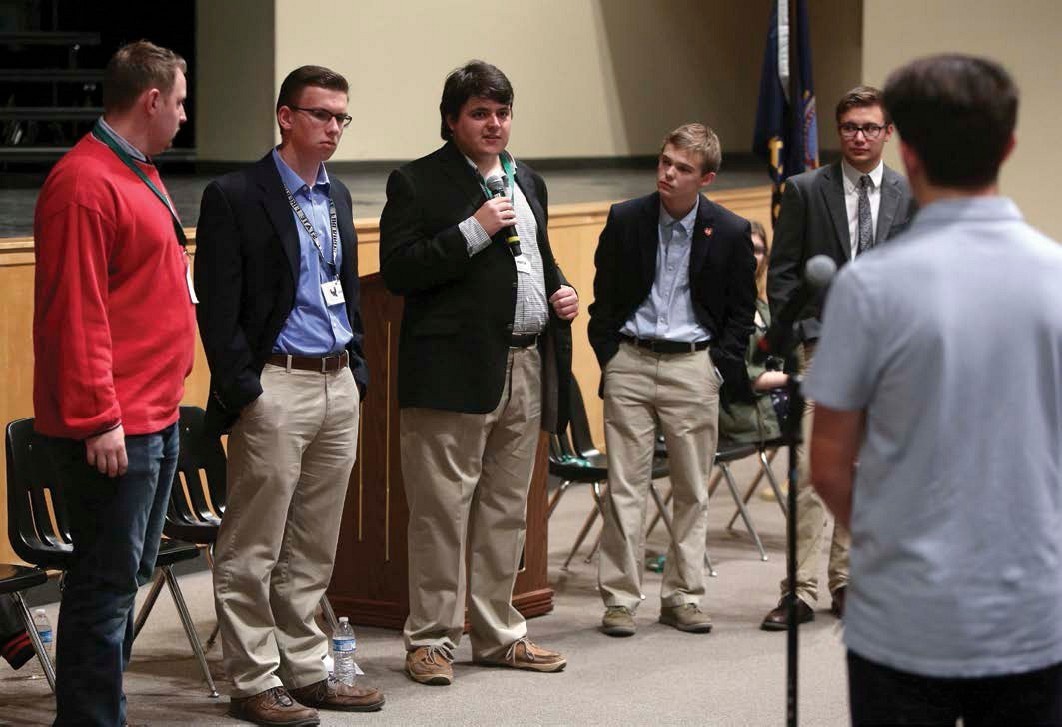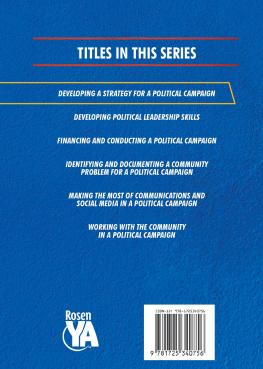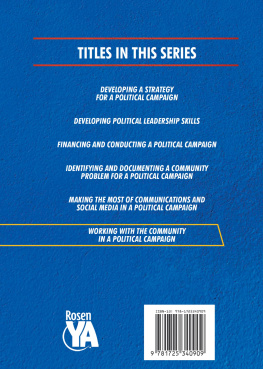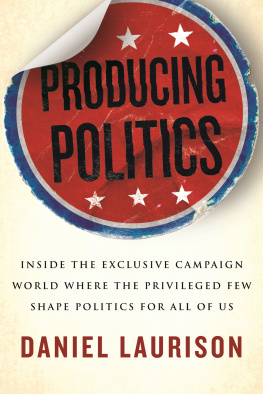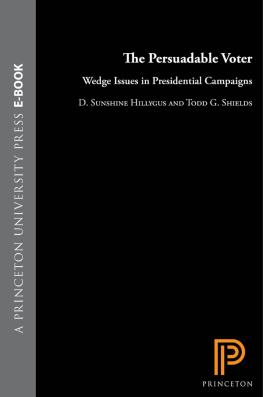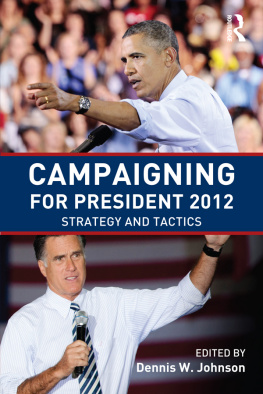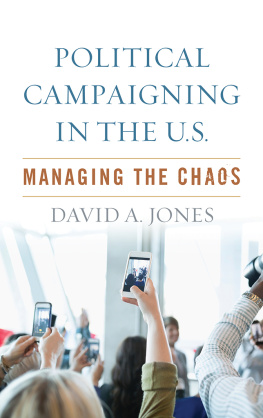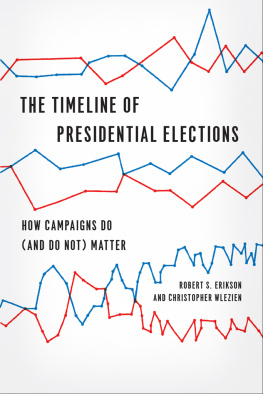
Published in 2020 by The Rosen Publishing Group, Inc.
29 East 21st Street, New York, NY 10010
Copyright 2020 by The Rosen Publishing Group, Inc.
First Edition
All rights reserved. No part of this book may be reproduced in any form without permission in writing from the publisher, except by a reviewer.
Library of Congress Cataloging-in-Publication Data
Name: Banigan, Melissa, author.
Title: Developing a strategy for a political campaign / Melissa Banigan.
Description: New York: Rosen Publishing, 2020 | Series: Be the change! Political
participation in your community | Includes bibliographical references and index. |
Audience: Grade 7 to 12.
Identifiers: LCCN 2019008479| ISBN 9781725340756 (library bound) |
ISBN 9781725340749 (pbk.)
Subjects: LCSH: Political campaignsUnited StatesJuvenile literature. | Campaign
managementUnited StatesJuvenile literature. | Politics, PracticalUnited StatesJuvenile
literature. | United StatesPolitics and government20th centuryJuvenile literature.
Classification: LCC JK2281 .B34 2019 | DDC 324.7/20973dc23
LC record available at https://lccn.loc.gov/2019008479
Manufactured in the United States of America
CONTENTS
CHAPTER ONE
WHAT IS A POLITICAL CAMPAIGN?
CHAPTER TWO
HOW TO GET PEOPLE TO LISTEN
CHAPTER THREE
WINNING A POLITICAL POPULARITY CONTEST
CHAPTER FOUR
MONEY, MONEY, MONEY
CHAPTER FIVE
PULLING IT ALL TOGETHER
INTRODUCTION
A fter seventeen people were murdered during a shooting at Marjory Stoneman Douglas High School in Parkland, Florida, in 2018, Cameron Kasky, a student at the school, invited a few other students to his house to talk about how they could fight back against gun violence. They decided to start a movement called Never Again. Overnight, Never Again became an explosive political campaign that changed the conversation about gun violence in America, even prompting lawmakers in Florida to pass stricter gun control laws.
At first glance, it may seem like the Never Again campaign was destined to succeed. Kasky and his friends passionately denounced gun violence and millions of people across the country jumped on the bandwagon. Yet it takes a lot more than passion to convince lawmakers to write new policy or to elect politicians to office. Successful political campaigns also require a winning strategya plan of action designed
to achieve a goal.
Consider the game of chess. Each player starts off with sixteen game pieces, including a king and a queen. The objective of the game is to capture the other players king. Each player takes turns trying to attack and capture the other players pieces on the board until one of the kings is finally taken. A winning strategy in chess is harder than it looks: players need to focus just as much on the goal of trying to capture the kings as they do on short-term actions. Together, the explicit goal of capturing the king and planning the moves that lead to that capture form the strategy of the game. The strategy of a political campaign is similar to a chess strategy in that one must consider both shortand long-term goals. The best campaign managers study and implement moves that have worked in other campaigns.
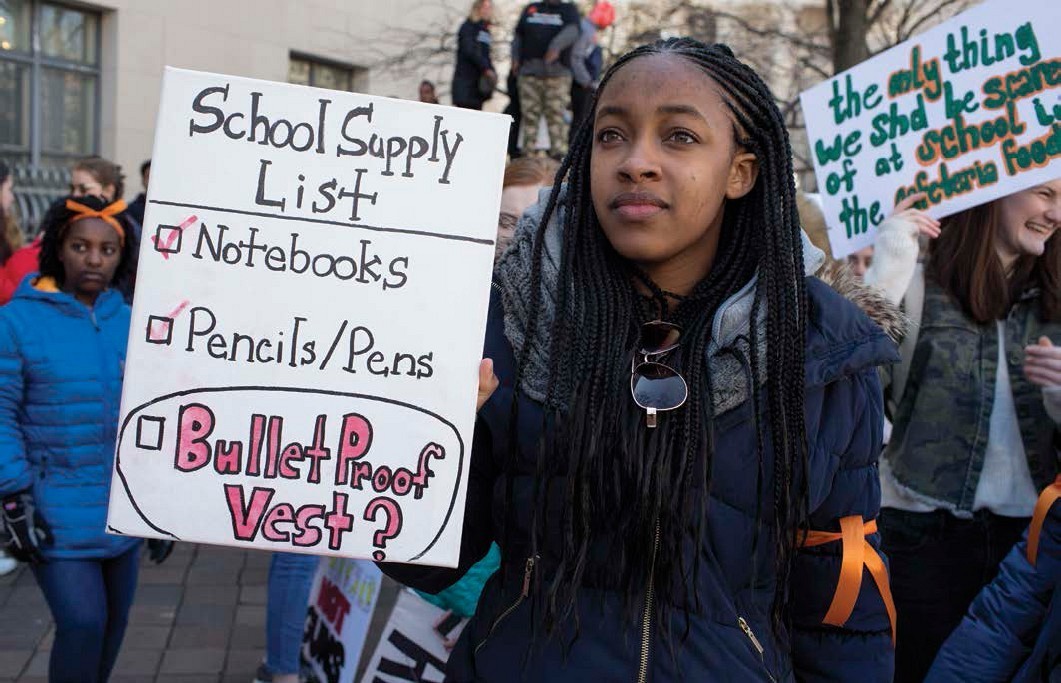
The Never Again movement became successful because the political strategy behind the movement combined a series of shortterm actions and long-term goals with a powerful message.
Cameron Kasky and the other teens who started Never Again wrote speeches that went viral, and their words inspired student walk-outs across the country and gained the support of celebrities. The teens even organized a demonstration in Washington, DC, called the March for Our Lives, and went on a national tour to encourage young people to register to vote. Yet it wasnt only the speeches, the walk-outs, or the celebrity attention that mattered, but rather the strategy that strung those things together. First, the teens developed a strong messagestrengthening gun control laws to end mass murder in schoolsthat resonated with Americans from all walks of life. Second, the Never Again campaign was successful because it was open to anyone who wanted to join, so the number of people involved in the campaign kept growing, strengthening it further.
Laws dont get passed and presidents, council members, and even class presidents dont get elected without strategists who come up with a strong message and plan moves that can be implemented by a passionate group of campaigners. Learning how to develop a strategy for a political campaign can take you one step closer to spreading your message and winning the support of your community.

WHAT IS A POLITICAL CAMPAIGN?
P olitical campaigns are designed to influence how a specific group of people makes decisions about issues or candidates who will be elected to office, and they are never simple. Most political campaigns are designed to appeal to a group of peoples existing beliefs. For example, a Democratic campaign will generally appeal to people who identify as Democrats, while a Republican campaign will appeal to people who identify as Republicans.
Yet what happens when there are a number of people in the same political party who want to run for one office? Or when a candidate wants to push a bold new agenda? Or even when a group of teens wants to push the nation into passing new laws? In these cases, political strategists need to come up with ways to convince people that the ideas and messages of the campaign will benefit them.
Its not easy to convince someone to support a new idea, and its especially hard to change a persons political beliefs. Peoples politics are strongly connected to their personal identities, and many people feel like they are being personally attacked when their political views are challenged. In fact, a 2016 study in the journal Scientific Reports suggests that people are resistant to arguments that contradict their political beliefs, even when those arguments are strongly backed by factual evidence. So a political campaign must also appeal to voters emotions.
EVERYONE CAN PARTICIPATE IN A DEMOCRATIC CAMPAIGN
There are many kinds of political campaigns. In a democracya system of government in which all eligible members are allowed to vote for people to represent thema campaign is often called an electoral campaign. Electoral refers to the word electorate, which is all the people who are eligible to vote.
Electoral districtsthe area in which a political campaign, election, and vote take placecan be villages, towns, cities, or countries. The people within these districts may identify as Democrats, Republicans, Greens, or Libertarians, or they may not be affiliated with any political party. Some members of the electorate may even decide not to vote, but that doesnt mean theyre not a part of the electorate.
The biggest electoral campaigns focus on candidates who are running to become heads of state or heads of government, such as presidents and prime ministers. But there are all sorts of other electoral campaigns that support candidates running to sit on local school boards or city councils, as well as county commissioners, justices of the peace, state representatives and senators, and governors.
